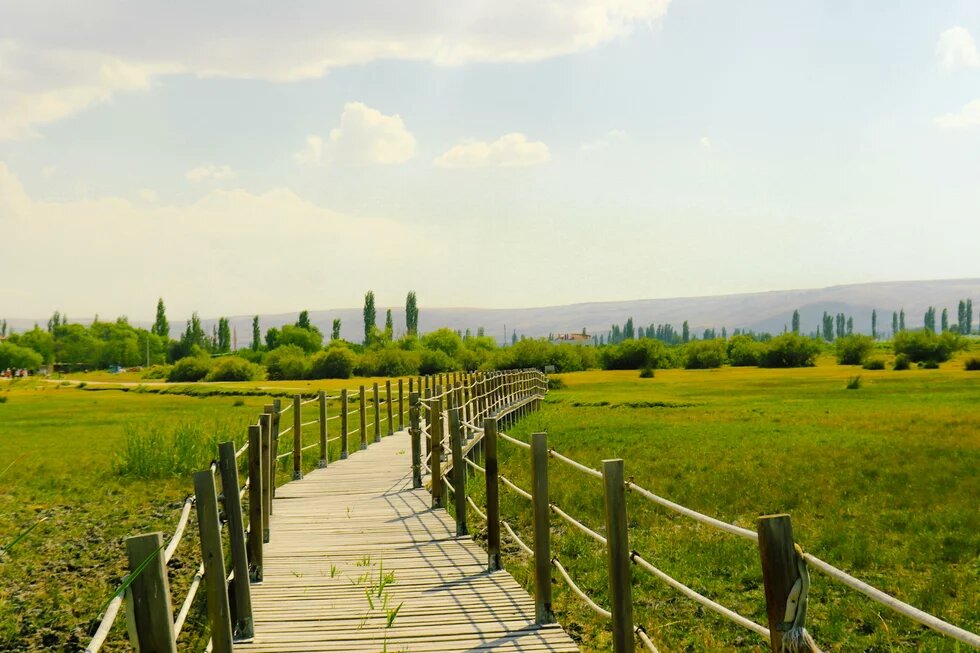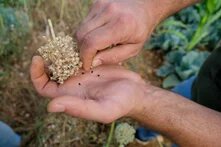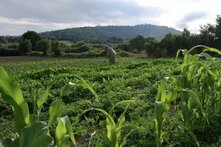Agroecology in Turkey is more than a set of farming techniques; it is a battleground of ideas. From grassroots movements pushing for systemic change to policymakers framing it as a technical tool, competing narratives are shaping who controls food systems, how communities thrive, and what the countryside will look like tomorrow.

In Turkey, agriculture is not only at the heart of environmental and economic pressures, but also at the centre of profound social and cultural transformation. Migration from rural areas, climate change, and increasing market dependency are straining production systems, while farmers’ autonomy is eroding, traditional knowledge is fading, and local cultures are being sidelined. Within this shifting landscape, agroecology is not a new invention, but rather a reclaiming and revitalization of traditional and ecological knowledge, practices that have long existed in every corner of the world, now reinterpreted in response to contemporary challenges.
Reconnecting People, Land, and Knowledge
Globally, agroecology is recognized as a key pillar in the struggle for food sovereignty, offering alternatives to the industrial food regime (de Souza, 2022; IPC, 2015). Yet as its popularity grows, institutional actors—governments, corporations, and international organizations—have often sought to redefine it in narrower, more technical terms, stripping away its transformative political roots (Levidow, 2015; Rivera-Ferre, 2018). Scholars and practitioners alike describe agroecology as science, practice, and social movement, but its meaning remains contested, with over twenty distinct definitions differing in scope and emphasis (Bell & Bellon, 2021).
The roots of agroecology lie in the everyday practices of peasants and small-scale farmers
In Turkey, agroecology is gaining visibility not only in alternative farming practices but also in urban food initiatives. This rise is shaped by diverse actors, including farmers, cooperatives, civil society organizations, and it is influenced by both local and broader policy contexts. As Rosset and Altieri (2017) emphasize, the roots of agroecology lie in the everyday practices of peasants and small-scale farmers. In the research conducted1, some farmers interviewed had never encountered the word “agroecology,” yet their practices embodied its core principles—confirming Rosset and Altieri’s suggestion They worked with nature rather than against it, relied on ecological pest management and biocontrol, and embraced cooperation and solidarity within their communities as conscious social and political choices. These conversations revealed to me that agroecology is not only about farming techniques but also about relationships, community, and the ways people care for their land and for each other.
Debating What Agroecology Really Means
For some, such as the Farmer’s Union (Çiftçi-Sen), agroecology is more than a set of farming practices: it is a radical tool for social transformation (Doğançayır & Kocagöz, 2017). From this perspective, agroecology is understood as a way to reclaim control over food systems, empower smallholders who are often marginalized within industrial agriculture, revive and safeguard traditional ecological knowledge, and strengthen solidarity ties between producers and consumers. Others, particularly many policymakers, adopt a narrower view, treating agroecology as a bundle of sustainable techniques compatible with existing market structures and focused on incremental improvements rather than systemic change. Accordingly, some initiatives of the central government have promoted one-dimensional, technique-focused agroecological projects, often in partnership with international institutions.
Local governments, in contrast, tend to show greater variation. While some municipalities reproduce the same technical approach, others recognize in agroecology an opportunity to reform the local agrifood landscape and to connect with international agroecological networks. In certain cases, these municipalities go further, actively encouraging initiatives that not only support ecological farming but also aim to spark cultural and societal change within the agrifood scene (Büyükyılmaz, 2020; Karakaya Ayalp et al., 2022).
Over the past decade, Nilüfer Municipality has emerged as a local pioneer in promoting agroecology, combining support for small-scale producers with broader efforts to reshape the relationship between citizens and food. Through international food system transformation projects, the municipality has established and supported agricultural and women’s cooperatives, seed libraries, community-supported agriculture schemes, farmers’ markets, and training programs on ecological farming. These efforts show that the municipality treats agroecology not only as a technical issue but also as a civic and cultural project. These efforts strengthen solidarity between urban consumers and rural producers while aligning the municipality with international agroecology networks. Yet, since this is largely a top-down transformation, even if participatory in structure, its outcomes face the risk of remaining limited in scope.
Three dominant discourses shaping agroecology in Turkey.
The primary objective of the research was not only to map the existence of these discourses, but to systematically identify where and how they are constructed and negotiated in Turkey. Using surveys and in-depth interviews, the research examined how agroecology is understood and practiced across diverse stakeholder groups in Turkey, revealing overlaps, boundaries, and tensions between competing discourses. This research, completed in the summer of 2024, revealed three dominant discourses shaping agroecology in Turkey. These findings not only confirm previous research on how agroecology has been redefined and co-opted but also contribute to its depth in the local context.
- Transformative Agroecology: This narrative sees agroecology as a social movement rooted in justice, food sovereignty, and collective action. It emphasizes minimal external inputs, the revival of local knowledge, and the creation of self-sufficient communities. Here, agroecology is a political project, challenging the power of agribusiness and advocating for systemic change.
- Reformist Agroecology: In this view, agroecology is a set of technical solutions promoted by the state, agribusiness, or international organizations. It focuses on gradual reforms, education, and the integration of agroecological practices into existing systems—often without questioning underlying power relations or market dependencies. Reformist agroecology does not seek to revolutionize the system entirely but rather aims to improve it for societal or economic reasons, sometimes seeking the best possible solutions without becoming politically radical. However, it ultimately risks reproducing the existing corporate food system.
- Laissez-Faire Approach: This perspective treats agroecology as an individual, market-driven endeavour. It opposes government support or collective action, framing agroecological products as premium goods for high-income consumers. Here, agroecology risks being co-opted as a brand, rather than a movement for justice or sustainability.
The presence of these three discourses also signals the risk of agroecology being co-opted by powerful agrifood actors. Global experiences illustrate different trajectories. In Cuba, agroecology was not an ideological choice but a survival strategy after the collapse of the Soviet Union, which forced a radical shift toward low-input, ecological practices (Boillat et al., 2012; Rivera-Núñez et al., 2020). In Latin America more broadly, grassroots peasant movements such as La Vía Campesina pushed governments, particularly in Brazil and Nicaragua, to formally integrate agroecology into national policies (Van Den Berg et al., 2022).
In contrast, in Europe, agroecology has often been reframed in narrower, technocratic ways: in France it has become synonymous with “ecological intensification” (Levidow, 2015; Rivera-Ferre, 2018), while in the UK it has largely been reduced to technical fixes and efficiency-oriented innovations (Ajates Gonzalez et al., 2018). In India, meanwhile, state-led “agroecology” programs that initially built on peasant knowledge were later appropriated by powerful actors, ultimately reproducing capitalist, colonial, and patriarchal structures rather than addressing deep-rooted inequalities (Ramdas & Pimbert, 2024).
Bridging Actors and Building Alliances for Change
These narratives do not merely reflect academic debates; they actively shape the future trajectory of agroecology in Turkey. The growing involvement of central and local governments, together with their partnerships with civil society, offers hope for scaling up transformative practices. Conversely, the absence of sustained economic, social, and political support or a narrow, technocratic definition of agroecology risks undermining its potential to address ecological degradation, strengthen rural economic resilience and demographic renewal in the face of outmigration, population aging, and farm abandonment, while contributing to wider sustainability goals. Yet, the danger of “corporate capture” and the dilution of agroecology’s radical potential remain a pressing issue, particularly as institutional actors attempt to confine it within existing policy frameworks.
The danger of “corporate capture” and the dilution of agroecology’s radical potential remain a pressing issue.
The long-term success and permanence of transformative agroecology in Turkey will likely require strategic alliances between reformist and transformative actors. While institutions and policymakers are more inclined to support reformist agroecology, the economic pressure on farmers and the dominance of neoliberal, corporate-oriented agriculture make it difficult for transformative practices to spread without broader, structural support. For transformative agroecology to become a viable and widespread alternative, sustained support from local governments and international organizations is vital.
Moreover, the active involvement of civil society organizations, urban food initiatives, and solidarity-based producer–consumer relationships will be decisive in shaping the future of Turkish agriculture. In a context where neoliberal and autocratic pressure remain high, even reformist-leaning support from local governments and international institutions can provide crucial resources and legitimacy for agroecological alternatives. Only through such multi-actor collaborations and grassroots mobilization can the seeds of a more just, resilient, and system-changing agroecology take root and flourish in Turkey.
References
Ajates Gonzalez, R., Thomas, J., & Chang, M. (2018). Translating Agroecology Into Policy: The Case Of France And The United Kingdom. Sustainability, 10(8), 2930. https://Doi.Org/10.3390/Su10082930
Bell, M. M., & Bellon, S. (2021). The Rhetorics Of Agroecology: Positions, Trajectories, Strategies. In Agroecological Transitions, Between Determinist And Open-Ended Visions (Pp. 289–309). Peter Lang.
Boillat, S., Gerber, J.-F., & Funes-Monzote, F. R. (2012). What Economic Democracy For Degrowth? Some Comments On The Contribution Of Socialist Models And Cuban Agroecology. Futures, 44(6), 600–607. https://Doi.Org/10.1016/J.Futures.2012.03.021
Büyükyılmaz, M. (2020, July 2). Üreticiler Ve Uzmanlar Agroekoloji Ile Ticarileşmenin Arka Planını Anlattı: Organik Tarım Ama Nasıl? Independent Türk.e.
De Souza, C. C. (2022). The Role Of The State In Agroecological Transitions [Master’s Thesis]. Utrecht University.
Doğançayır, C. M., & Kocagöz, U. (2017, April). Operationalizing Food Sovereignty: A Critical Approach From An Ongoing Experiment In Türkiye. The Future of Food and Challenges for Agriculture in the 21st Century: Debates About Who, How And With What Social, Economic And Ecological Implications We Will Feed The World.
IPC. (2015). Declaration Of The International Forum For Agroecology. International Planning Committee For Food Sovereignty.
Karakaya Ayalp, E., Yılmaz, M. C., Geçer Sargın, F., Kuban, B., & Akgül Mahrebel, G. (2022). Roadmaps To Foster Urban Food System Transitions: Multi-Level Implementations In Nilüfer Türkiye. The European Journal Of Research And Development, 2(2), 400–410.https://Doi.Org/10.56038/Ejrnd.V2i2.87
Levidow, L. (2015). European Transitions Towards A Corporate-Environmental Food Regime: Agroecological Incorporation Or Contestation? Journal Of Rural Studies, 40, 76–89. https://Doi.Org/10.1016/J.Jrurstud.2015.06.001
Ramdas, S. R., & Pimbert, M. P. (2024). A Cog In The Capitalist Wheel: Co-Opting Agroecology In South India. The Journal Of Peasant Studies, 1–23. Https://Doi.Org/10.1080/03066150.2024.2310739
Rivera-Ferre, M. G. (2018). The Resignification Process Of Agroecology: Competing Narratives From Governments, Civil Society And Intergovernmental Organizations. Agroecology And Sustainable Food Systems, 42(6), 666–685. https://Doi.Org/10.1080/21683565.2018.1437498
Rivera-Núñez, T., Fargher, L., & Nigh, R. (2020). Toward An Historical Agroecology: An Academic Approach In Which Time And Space Matter.
Rosset, P. M., & Altieri, M. A. (2017). Agroecology: Science And Politics. Practical Action. Publishing. https://Doi.Org/10.3362/9781780449944
Van Den Berg, L., Behagel, J. H., Verschoor, G., Petersen, P., & Gomes Da Silva, M. (2022).Between Institutional Reform And Building Popular Movements: The Political Articulation Of Agroecology In Brazil. Journal Of Rural Studies, 89, 140–148. https://Doi.Org/10.1016/J.Jrurstud.2021.11.016
Footnotes
- 1
This research was conducted as a master’s thesis in the Environmental Sciences program at Boğaziçi University, under the supervision of Assoc. Prof. Dr. Pınar Ertör-Akyazı.

